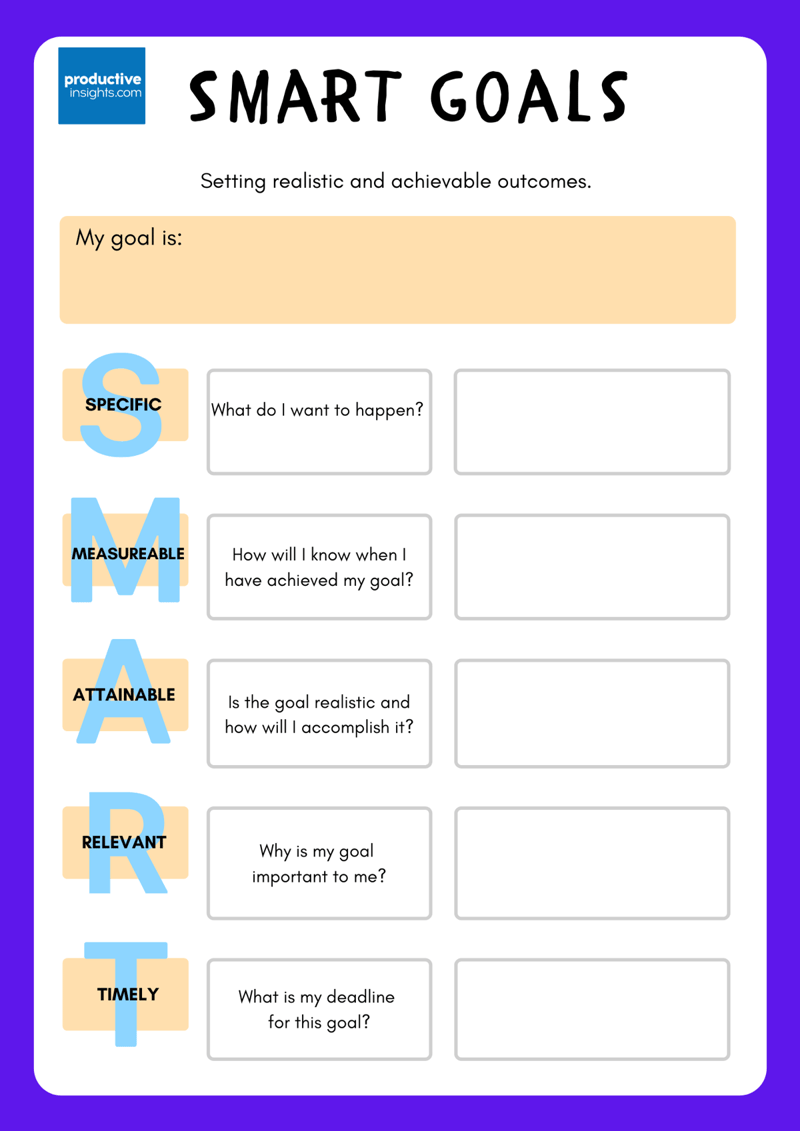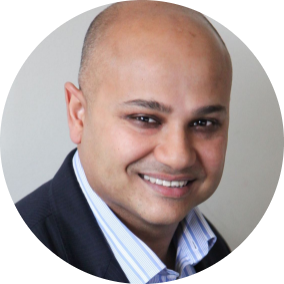Achieve Your Goals in 2025 – Get Your Free SMART Goals Worksheet
This worksheet has helped thousands set clear, actionable goals. Download it now!And so another year is almost upon us.
Most of us start to look at the next year and make resolutions (several of which we won't keep)
On a day-to-day basis, I think it makes more sense to focus on habits rather than only goals.
Goals are important in terms of helping us get clear on our direction.
But the magic happens in performing the habits.
In showing up every day.
As part of the Productive Insights membership program, a group of us get together over a zoom call and have an annual planning workshop.
The workshop consists of four main parts:
- Looking back and learning from the year just gone to get clear on what was most energizing and what we want to do more of in the coming year
- Choosing our goals for the next year
- Mapping those goals to specific habits
- And then measuring and tracking the habits each day (while tracking our goals on a quarterly basis)
This blog post is all about goal setting so we'll stick to that for now, but if you want to learn more about habit creation, I recommend checking out this conversation I had with James Clear — the author of Atomic Habits.
And if you'd like to watch my conversation with Brian Tracy on how he approaches the goal-setting process you might find that useful too.
The benefits of goal-setting
Setting clear goals is the first step to achieving them. Goals are powerful tools that motivate us to develop strategies that lead to goal achievement (provided we execute those strategies).
But here's the thing: most of us set too many goals and we tend to set them too far into the future.
The ideal time horizon for goal setting is about 90 days. It's not too far into the future to seem irrelevant and close enough to feel achievable.
When setting goals I recommend using the tried and testing S.M.A.R.T. approach.
The SMART goal setting system.
SMART is an acronym and stands for the following attributes (which you should ensure applies to each of your goals):
- Specific
- Measurable
- Achievable (or assignable)
- Relevant
- Timebound
Let's look at each one in turn.
Specific:
Setting specific goals helps you get clarity which drives motivation. Getting clear on the context of the goal often helps to increase your understanding of the goal and that leads to clarity and specificity.
Try asking yourself the questions that start with the 5 Ws when setting your goal:- What am I trying to accomplish?
- Why is this goal important to me right now?
- Who will be involved with this endeavor?
- Where will I have to be located to achieve this?
- Which resources will I need to involve?
Note: While specific goals are important (and valuable), Mark Manson makes a strong case for throwing general goals into the mix.
Measurable
How will you know when you've reached your goal?
How many happy customers will you have? How many new members will you have enrolled in your membership program? How much revenue or profit will you have made by the end of the quarter?
By having clarity around how you're going to measure your success you can track your progress which will help you stay motivated.
Tracking your progress to your goal helps you meet deadlines and feel the excitement of getting closer to achieving your goal.
Achievable
Setting unrealistic goals is demotivating. You need to ensure that your goal is realistic and attainable — ideally within the next 90 days.
The goals shouldn't be super easy to attain though. It should stretch your abilities but not be completely out of reach.
Some useful questions to ask to help you set an achievable goal include:- Can I do 10% better than I did last quarter?
- Will I be able to achieve this goal given the various financial constraints we're working with right now?
- Do we have the capacity to improve despite headwinds e.g. a contracting marketplace due to Covid-19?
- Do I have the resources I need to achieve this growth?
Relevant
You should set goals that are relevant to you and your business. This means they should align with your overall business objectives and your vision. They should also not be in conflict with your other goals.
Here are some questions you can ask yourself to test for relevance:
- Is this goal aligned with my company's vision?
- Does this goal align with our company values or is there a conflict?
- Is this the best time to work towards this goal? Are the market conditions favourable? Or are we better off doing this at a different time of year?
Timebound
Without a clear target date, you won't have a sense of urgency which means you won't have agency.
Here are some questions you can ask yourself:
- When will I have achieved this goal by?
- What milestones will I need to hit to achieve the goal and how will I measure my progress using those milestones?
- What do I need to do to get started today?
You might want to print out this goal-setting worksheet and get started now.

Bonus tip on goal setting
It pays to adopt a mindful approach when setting goals and when going about executing them.
A mindful approach to productivity is rarely spoken about but is probably one of the most important aspects if you want to be truly effective (not just efficient).
Mindfulness leads to better decision making which means you work on the right things. There's no point in being extremely productive if you're working on things that don't really move the needle in your business.
Peter Drucker put it every eloquently:
“Management is doing things right; leadership is doing the right things.” - Peter Drucker
And adopting a mindful approach ensures that you work on the right things.
Conclusion
Setting goals is critical because they create a point of focus. They help you garner your resources and direct them to an outcome way that's focused. They provide you with the motivation and excitement that you feel as you progress towards goal achievement.
But the value of habits is often overlooked. Goals are the destination but habits are the journey to that destination. That's where the rubber hits the road. That's where the magic happens.
What goals are you going to set for yourself in 2022? Let us know in the comments below.

